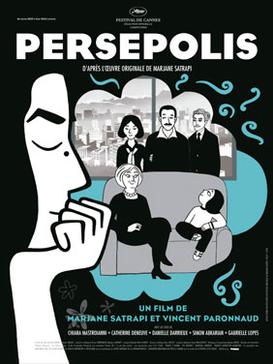 I watched Persepolis (Satrapi, 2007) this week. And, as much as I loved Ratatouille (Bird, 2007), I think Persepolis actually deserved the Best Animated Film Oscar more than the Ratatouille did. Persepolis has beautiful traditional animation with its own unique look -- a rarity today in the world of bland computer generated animation.
I watched Persepolis (Satrapi, 2007) this week. And, as much as I loved Ratatouille (Bird, 2007), I think Persepolis actually deserved the Best Animated Film Oscar more than the Ratatouille did. Persepolis has beautiful traditional animation with its own unique look -- a rarity today in the world of bland computer generated animation.The story (about being a teenager in Iran) raises interesting and subtle questions about remaining human in a politically repressive culture (see the quote I used as the title to this post). But one thing that struck me while watching the movie was how similar fundamentalist Islam is to fundamentalist Christianity. In fact, I began to wonder if Islam hasn't somehow influenced Christianity in things like the rejection of alcohol, belief in the literal interpretation of Scripture (seen as divinely dictated word-for-word), use of political power to coerce religious adherence, divine voluntarism in ethics (i.e., the belief that God arbitrarily makes up moral laws that have no necessary basis in human nature), etc.
None of these doctrines is traditional in Christianity (I don't know about Islam). They seem to have arisen for the first time around the time of the Protestant Reformation in the Late Medieval/Early Modern period. So where did they come from? Some of these common doctrines are probably due simply to the nature of fundamentalism itself and tend to show up in any religion's fundamentalist wing (e.g., literalism and coercive politics), and others do in fact seem to have derived from a direct historical influence of Islam on Christianity (e.g., voluntarism), but where does the prohibition on alcohol come from?


No comments:
Post a Comment